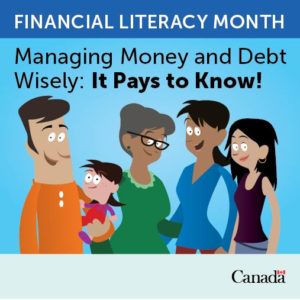By Kathryn Mandelcorn, FMA
 You did all the right things. You went to school and earned a good education. You’ve worked hard and been promoted. You earn upwards of $100,000 a year; yet increasing debt has your stomach in knots.
You did all the right things. You went to school and earned a good education. You’ve worked hard and been promoted. You earn upwards of $100,000 a year; yet increasing debt has your stomach in knots.
You are not alone. According to statistics Canada, higher income is associated with a higher debt load. Households earning at least $100,000 had an average debt of $172,400. Compare that to households earning between $50,000 and $100,000, which had an average debt of $95,400.
It doesn’t have to be this way. But before you can turn things around, it’s important to understand how you arrived where you are.
How Did I Get Here?
Technology has changed the world dramatically in the last 20 years. In many ways for the better, but the internet has also put shopping at our fingertips and smartphones keep us constantly connected to our work, and the work and lifestyles of everyone around us.
This new world has given rise to three of the primary reasons so many people are in debt despite earning a good salary: increased expectations of what we “deserve,” reduced downtime, and the erosion of debt stigma. Let’s look at the effect of each one. Continue reading



 Marriages suffer when there is financial stress. Sometimes they fail. In Canada, where the divorce rate is 48%, money issues are often cited as a contributing factor in a relationship’s downfall. But there is so much that you can do to start your wedded life on solid financial footing, and it all revolves around honest communication.
Marriages suffer when there is financial stress. Sometimes they fail. In Canada, where the divorce rate is 48%, money issues are often cited as a contributing factor in a relationship’s downfall. But there is so much that you can do to start your wedded life on solid financial footing, and it all revolves around honest communication.


 November is designated as Financial Literacy Month in Canada. Each year since 2011, the Financial Consumer Agency of Canada (FCAC), coordinates efforts between the private, public and non-profit sectors to promote financial literacy for all Canadians. This year’s theme: Managing money and debt wisely: It pays to know! is intended to highlight the importance of living within your means, knowing your financial rights and responsibilities and having a spending and savings plan that adapts to the different stages of your life.
November is designated as Financial Literacy Month in Canada. Each year since 2011, the Financial Consumer Agency of Canada (FCAC), coordinates efforts between the private, public and non-profit sectors to promote financial literacy for all Canadians. This year’s theme: Managing money and debt wisely: It pays to know! is intended to highlight the importance of living within your means, knowing your financial rights and responsibilities and having a spending and savings plan that adapts to the different stages of your life.

